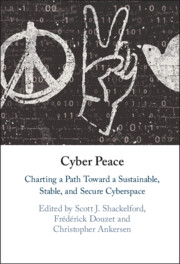Acknowledgments
This volume is like an iceberg: What you see reflects only a small part of the enormous efforts that lie below the surface.
The book began with a workshop co-hosted by the Ostrom Workshop of Indiana University, Geopolitics of the Datasphere (GEODE) of the University of Paris 8, and New York University’s Center for Global Affairs (CGA) held in New York City. Alongside chapter authors, discussants provided their perspectives on the notion of cyber peace, including Chris Painter, Pano Yannakogeorgos, Jason Healey, Camille François, Angie Raymond, Rob Knake, and Amanda Craig Deckard. The editors would like to thank them for their insights and ideas. The editors would also like to thank CGA’s Dean Vera Jelinek and its Director of Continuing Education and Public Programs Michelle D’Amico for their support.
Two additional cyber peace colloquia took place during 2020, facilitated by the Ostrom Workshop. A special thanks goes out to the team that made those events possible, including Emily Castle, Gayle Higgins, David Price, and Allison Sturgeon.
The editors would like to acknowledge the contributions made by the phalanx of graduate students from Indiana University involved in copyediting the chapter drafts, including Noah Galloway, Jalyn Rhodes, and Alexandra Sergueeva.
Finally, our thanks go out to Matt Galloway, Cameron Daddis, and the team at Cambridge University Press for their editorial and production assistance.
Funding for this volume has been graciously provided by the Ostrom Workshop, GEODE, and the Hewlett Foundation, with open access being generously supported by a gift from the Microsoft Corporation.

